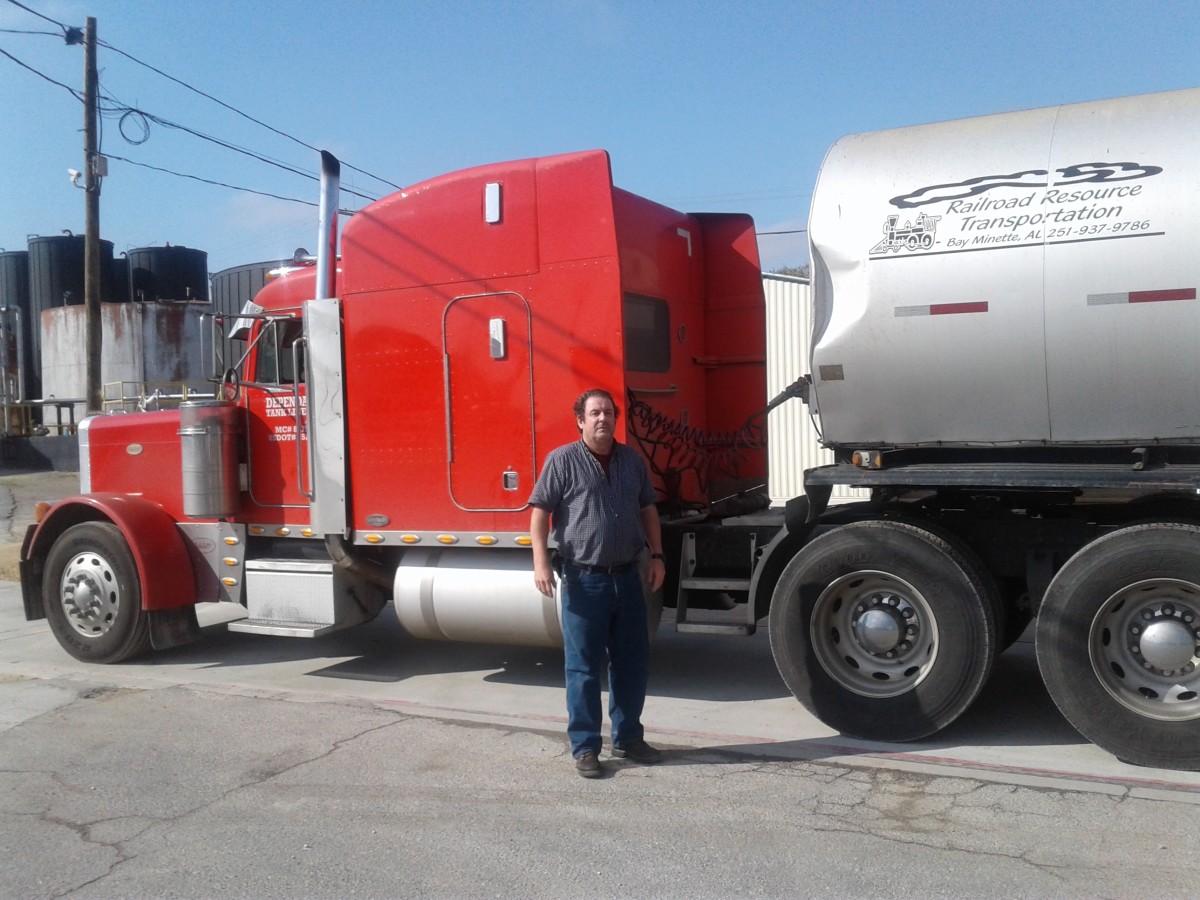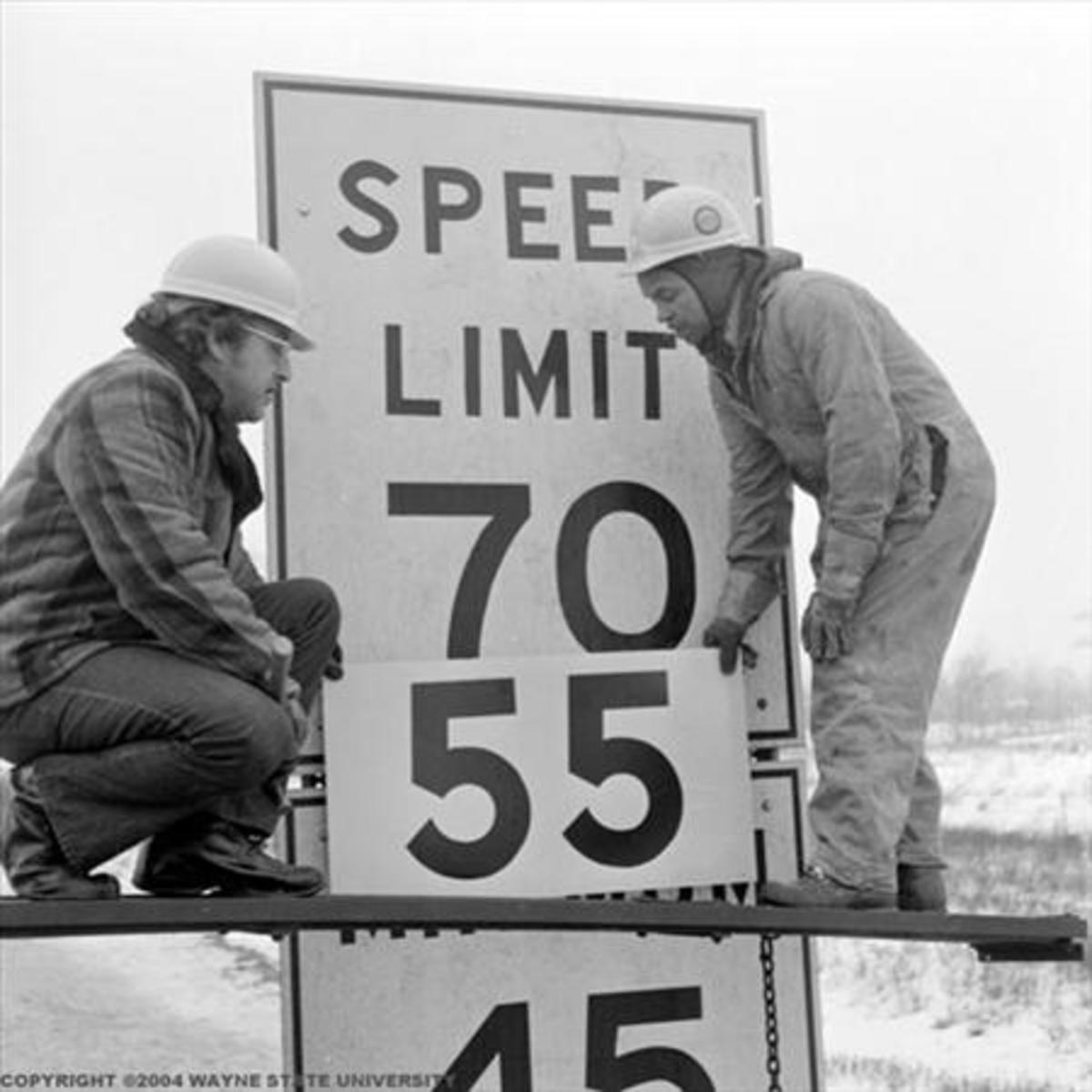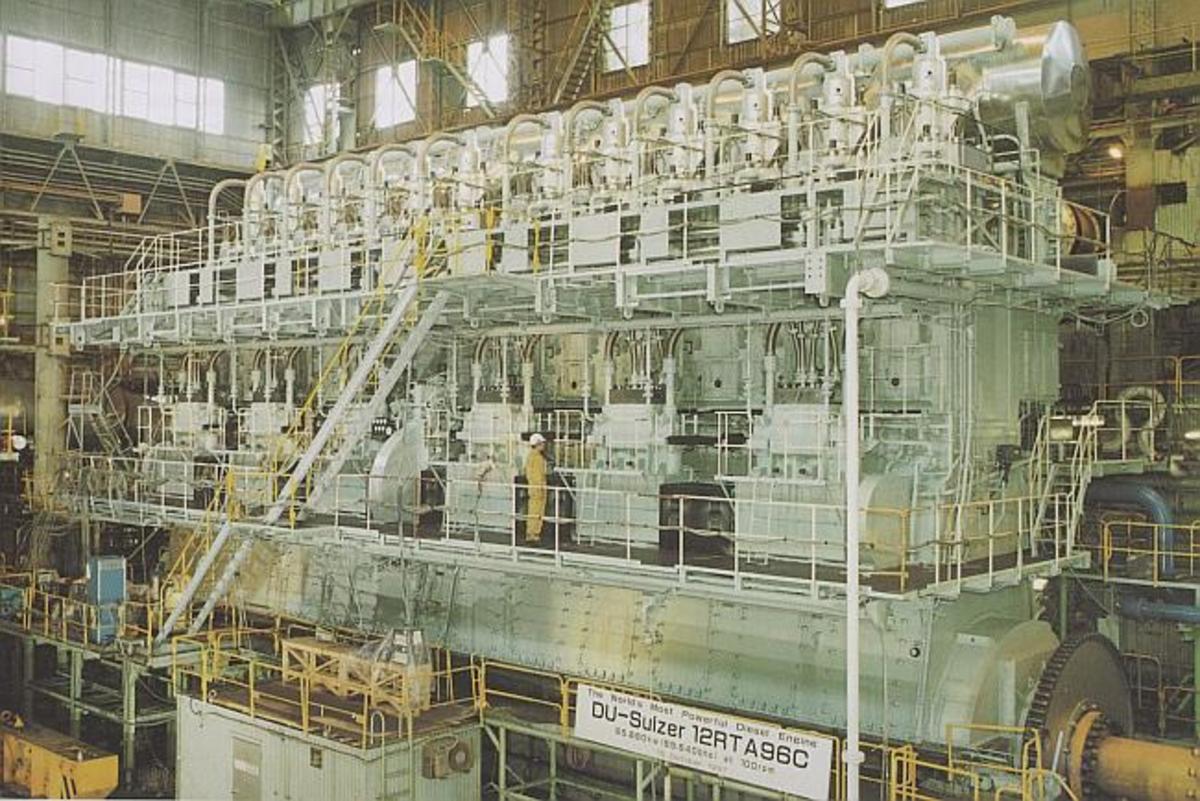Truck Driver Logs; Hours of Operation and the 1/2 Hour Rule

The 1/2 hour mandatory break for commercial truck drivers requires a driver to go off duty and show on his logbook an extra half hour each day that he was not working or driving his truck. Let me start this hub by stating that the purpose of Commercial Driving is to haul freight, and to get the product delivered to its destination. The hours spent getting it there are your "workday". Reversely, the hours you spend at night and at home and in bed are your personal hours, and your hometime and most importantly your "sleeptime". So I make this point right off the bat, that to require a driver to take a 1/2 hour break during a specific time of the day to sleep, or to rest is equal to someone who has the authority telling us that we have to wake up at 2 AM, get in a truck and drive 1/2 hour because we need a break from sleeping! Do you get the point? Daytime is for working and night time honey, is for sleeping!
Sure, I can manage to fit half an hour somewhere into my logs each day. but here's the point(s). These are all points that negate the reason for having a 1/2 hour break legislated into the truck drivers day. There are no positive points. None at all. Not as this rule stands.
1. At the 6-8 hour period of a drivers day, he may be on the road with no place to stop. If he did stop during this period, he possibly would have no place to sit and relax, no place to eat or have refreshments, and finally unless he has a sleeper cab, he will have no place to lie down on a cot for a nap. Is the government ready to furnish "rest and refreshment" trailers that are portable and on locations wherever my 1/2 hour legal rest period happens each day?
2. There is an important mission that the driver must accomplish with his contract to haul or his daily local/ regional driving assignment. He must use all his time and hours to accomplish this job, and usually with a delivery time already set, or even a second haul that cannot be done until the first haul is accomplished. A 1/2 hour mandatory rest rule might interfere with pick- up or delivery times. In reality, a driver today probably has to wait and see if he has had no delays even to think about stopping. Which leads to the next argument.
3. Lets say a driver did honestly take his prescribed 1/2 hour rest prescription at the mandated time of 6-8 hours into the shift, and lets say, he wasn't hungry, so he didn't eat, he tried to go potty and couldn't, and lets say finally he wasn't sleepy at that point, so he spends a miserable 1/2 hour trying to satisfy some politicians Idea of safe driving. Can I ask you a question here? His time is limited to a 14 hour work day, and his drive time and load time only allowed him a few minutes of time to take care of his personal needs during the day. So, can you see where I am going with this? THIS driver is now forced into illegal overtime to stop when he REALLY needs to go potty, when he REALLY needs to eat, or when he REALLY needs to rest.
4) What if during the day the truck has a flat, and time is lost due to that? Or a stop has to be made for truck fuel? Sure you might say, "Oh, they can incorporate the 1/2 hour legal rest into these events!" NACH!!! The rules already say that you cannot claim you are off duty if you are in charge of your vehicle or responsible for repairs, etc. so this becomes a conflict. Let me state that already the logs of many drivers are breaking this requirement. They are logging and reflecting this 1/2 hour legal rest into the mill or warehouse load time. Again, let me point out that the legal time for this 1/2 hour break is the 6-8 hour window and if trucks inadvertently pulled into unauthorized driveways and along busy roadsides halfway in between departure and destination, I promise you there would be another group of angry taxpayers saying "what the heck!". So this does not happen. I've not seen it happen at all.
5) The next argument to this scenario is the company rules. Today trucking allows certain trust levels, whereas a driver can park his truck at home or sometimes even bobtail home with his truck. but other than this they restrict and frown on using the truck for personal business. So if they see you sitting at a non-authorized location, there might be repercussions for the driver. So he has to be careful to try to stay on an authorized route, as well as making only authorized stops. It's not in the best interest of the driver to stop anywhere else than what his company and their insurance allows. It is also in the best interest at this point for the trucking companies to look and see if the government is imposing on free trade rights and on their rights to operate as they see fit as a free enterprise, which leads me into the next subject.
6) Making laws do not necessarily make the roadways safer. It is a combination of excellent training for drivers, experience and implementing safe practices, from the licensing of drivers, to the corporate HR requirements for drivers within a company, to simply the driver doing a good job. When I started I mentioned there are no positive arguments to support this law. I believe now you also see this to be true. HOWEVER, drivers DO need time during their day to take care of themselves as well as to get the job done and all aspects of driving. They just DON'T need it to be a restrictive law that is imposed on them that actually hinders them from safely and efficiently performing their duties. It can even become dangerous to the public and the roadways when a driver is only concerned about following (too many) imposed safety rules. Logs books are already being done while driving, and a driver is tempted to "make up time" by eating and taking care of other business while rolling. Taking his precious work time away from him will not better our safety goals in any way.. It will only make the driver have to work longer hours and get less sleep at night, which as things which go around come around, they are less likely to drive efficiently and safely during the daytime. Again, it's like waking you up during the night-time and saying, hey you're sleeping too much, so get up for a half hour, go get in the truck and drive a while.. This will make you sleep better! duh!! Excuse me? Can you rephrase that puh-lease?
The arguments could go on and on, but even though a very few drivers might say, "no big deal, this works out OK in my schedule"; most regional and local drivers cannot say that. IF you give me 1/2 hour with any one of them and their logbook I will show you they aren't realistic. IN fact a driver might come across with this line of defense. "This is how I'm "saying" my day went". And it would clearly be only a couched statement to show he is trying to "log up to the rules.. What he is NOT saying, is what rules he accidentally broke in order to follow this one. You can bet your last dollar though that they ARE attempting to follow the rules. It is just simply not possible for me to log a 1/2 hour rest period when YOU want me to do so, instead of when it actually has to take place,
I'm offering as a solution that if you want this rule to remain, then amend it to give the driver total discretion. Give him the freedom to eat when he is hungry, to go potty when he has to "dookee", and finally the right to 1/2 hour of rest when he is tired and needs to rest. Just like I trust you to go home and go to bed every night, and to get up and drive safely to your place of employment, you need to trust me as the professional truck driver to get my sleep at night and to operate and control my commercial truck safely and to meet the legal requirements while doing so, but you don't need to tell me when I need to eat, rest, or exercise my body functions during my day. Should I get into the reasons why first-graders need bathroom passes and why they can't all go at the same time? Geez!! I hope this helps a lot of people understand the bogus 1/2 hour legal rest rule. It's nice that someone thinks drivers need extra time to take care of needs, but its not helping, It's a rule that we don't need. Drivers know when they need to do these things without this rule. Please let me know your thoughts and opinions.
Coming up to speed on this issue.
After a few months of working under this rule and having some difficulty making my logbooks reflect the 1/2 break, I somehow manage to get it done. One thing that helped was a supervisor with enough understanding to explain the purpose and perhaps the mentality of the new rule. However, there seems confusion still about when you can or can't log that 1/2 break. It apparently CAN be when you are in a mill to unload or unload. The safety supervisor suggested pulling over when you have just left the mill and have scaled out, before going back onto the road. Doing it while in the mill brings the question or challenge, " were you really off duty?" Well, some drivers think that yes you can sit in your truck in a semi- comatose state while waiting for the truck ahead to get off the dump and fulfill the intent of the rule. In my case the most important thing I have had to work on is to simply make sure I get this time logged in the right time frame each day.. Its like a virtual reality puzzle to try and manage this time so that you don't get written up by the company safety department. in further explanation it was explained that when DOT officials arrive at the Transport office, they take their time and go through drivers logs and if all safety items are not observed the company itself can get huge fines. So that upped the challenge in my mind to get er done!. Even though some more locally positioned drivers may not technically be required to take this break due to the 150 mile radius rule and could potentially use a time card instead of a logbook as long as they stay under the 12 hour day.. But this exception is part of my argument that using the 1/2 break rule arbitrarily like this suddenly makes a nominally scheduled 12 hour day into a 12 1/2 hour day taking you outside the limits of the 12 hour and 150 radius rule. Again it leads to the premise that complicated rules tend to break less complicated rules.. I say leave well enough alone.. this 1/2 hour rule urgently needs to be reconsidered, modified or rescinded. Go tell the legislators they are working too hard and THEY need another 1/2 hour coffee break, if it won't break the states budget! If you need it bad enough I can buy you a cup of coffee, and maybe a donut if you use a little more consideration for me the driver.
Hidden Cost of Compliance
Every time you want to utilize this 1/2 hour mandatory break, you add time to your day, including extra time to find a place to pull off and take this break. At times it might take you 5-10 minutes to slow down and find a safe place to exit the roadway and take this break! This translates into a HUGE time and money cost for the driver, and indirectly for the company! So a 1/2 hour break turns into almost an hour of lost time on the job EACH DAY. I wonder what it actually adds cost-wise? How much income are you losing weekly, monthly? I should go so far to say It is ALREADY a mishap due to management oversight, driver manipulation and desperate attempts to try to "live" with this erratic and senseless rule! On the local and state scene, by the time daily driver needs are met including this new mandated one, two to three hours a day are wasted, time is lost, it lessens overall productivity, and lowers the per-driver load and efficiency rating. This all effects’ the gross income of a company, and consequently, less net profits! I estimate that if a driver only logs one daily 1/2 break,it reduces profits by 6% and if he loses his second or third daily load, it can cost him and the company as much as 30% in lost gross income: if he takes 2 required breaks morning and evening, and also has to make necessary driver stops in additoin, it can cost him and his company as much as 18% in lost daily gross income: (these figures are partially based on actual tickets and logs, and partially based on a calculated time factor.) Should Legislators have the authority to impact the industry so randomly and indiscriminately? Should I repeat that the 6-8 hour window might not even have you in an adequate location where you CAN find food, go to the bathroom, or have a place to get out of your truck and relax? So, again I ask what is the purpose of this rule? The times I DO pull off and take this break, very seldom am I able to get out of the truck. Once I pulled over on an apron along a two way secondary highway, and once in a gravel lot, I had to jockey, park and position the truck where I would not be blocked in when I wanted to leave; resulting that you tie me up longer, and also I could not leave the truck. This has a tremendous negative impact on the driver’s day, on the company schedule; not to mention net profits. This is one time, the driver might be "OK" with the company standing up for uninterrupted work patterns; except as the schedule, the assignment, and the events of the day predict. He needs to take any necessary break at his own convenience, knowing what his job requires; NOT according to the whims of some Washington autocrat, in a comfy office with no idea what "reality" is on the road!

Important Trucking Issues
- Grease your Semi-Truck Trailer and Save Thousands!
The extreme importance of greasing the eighteen wheeler steering, front end, brake, clutch, and drive-line components! tips to helping you keep rolling both safely and smoothly. - Modern Trucking and Time Management
Knowing the value of time management: A trucker can only be successful if he establishes a "routine", avoids industry "bottlenecks" and knows when he is saddling a dead horse. You will enjoy!
The Life of a Commercial Truck Driver
- The Life of a Commercial Truck Driver I
Commercial truck driving techniques, the challenge involved in everyday hauling, and long hours with fierce competition. A driver overcomes obstacles daily and has to keep his record spotless. - The Life of a Commercial Truck Driver II
In a continuing documentary style, the Author gives an update to the first story account of driving commercially in south Alabama. (Driving On the Road and in the Pulp Mills)
LP Tanker Truck Driver
- LP Tanker Truck Driver
My experience as a commercial LP haz tanker hauler, and acknowledgment to this being a fast growing segment of the trucking industry. Also an account of mechanical difficulties testing my abilities.
© 2014 Oscar Jones








